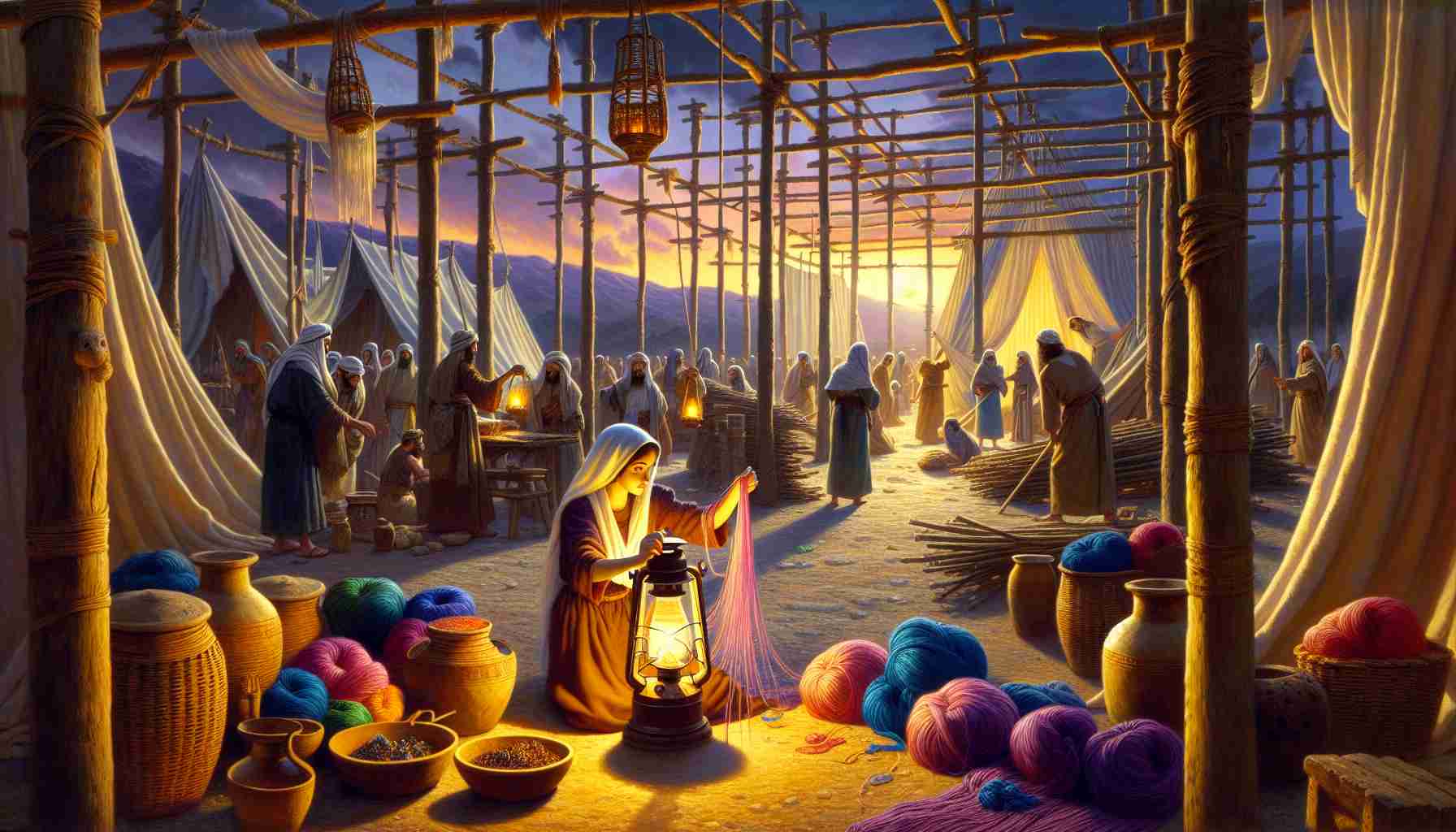

They called me Zerach, and I spent most of my life bending golden wire with bruised hands. I was a craftsman, one of the many whose skills were passed down from father to son, from Egypt to freedom. But when Moses spoke to us in the camp—beneath the desert sun, with wind stirring the edges of his cloak—I realized everything I had done until then was just practice.
He announced that the time had come to build the Mishkan—the holy place where God would dwell among us. Not for priests alone, not for the elders, but for the whole nation. He called for donations: gold, silver, wool, fine linen, wood, even oils and spices. And not just materials—God wanted skilled hands to turn them into a dwelling.
I had always worked with metal, but that day, I held something more than a tool—I held a purpose. My heart beat heavy in my chest. For once, my work would rise into something greater than me.
At first, I worried. What could my hands offer for something so holy? I wasn’t a prophet or a leader. I had seen terrible things in Egypt—as a slave, I shaped jewelry for the very people who whipped my brothers. My skills were born in chains.
But then I saw the people bringing their offerings. A mother laid down a copper mirror, her only one. A shepherd plucked threads of his finest wool, even though his flocks were thin. No one held back. It was as if, once building for Pharaoh, we now built for God—and it changed how each of us saw ourselves.
When Bezalel, the chosen artisan, called for help, I stepped forward. Bezalel was wise, filled with the spirit of God. He told me exactly how to twist the gold into settings and patterns for the garments of the priests. I had never worked so carefully. Every thread of gold, every filigree had a reason.
I remember one moment most. Late one night, after others had gone, I stayed to finish a piece for the ephod—the sacred vest the High Priest would wear. My hands trembled as I shaped the tiny clasps. Then it hit me—this piece, this work of art made by a former slave’s son, would be worn before the Ark of the Covenant. Before God’s presence.
Tears fell on the gold.
I was no longer a builder of idols for masters. I was building a home for holiness.
When the Mishkan was finally completed, and the cloud of God’s glory settled over it, something shifted in me. I was more than my craft. We all were. Our hands, our hearts, everything we had—we offered together. And through that, God made His dwelling among us.
We weren’t just free. We were a people with purpose.
They called me Zerach, and I spent most of my life bending golden wire with bruised hands. I was a craftsman, one of the many whose skills were passed down from father to son, from Egypt to freedom. But when Moses spoke to us in the camp—beneath the desert sun, with wind stirring the edges of his cloak—I realized everything I had done until then was just practice.
He announced that the time had come to build the Mishkan—the holy place where God would dwell among us. Not for priests alone, not for the elders, but for the whole nation. He called for donations: gold, silver, wool, fine linen, wood, even oils and spices. And not just materials—God wanted skilled hands to turn them into a dwelling.
I had always worked with metal, but that day, I held something more than a tool—I held a purpose. My heart beat heavy in my chest. For once, my work would rise into something greater than me.
At first, I worried. What could my hands offer for something so holy? I wasn’t a prophet or a leader. I had seen terrible things in Egypt—as a slave, I shaped jewelry for the very people who whipped my brothers. My skills were born in chains.
But then I saw the people bringing their offerings. A mother laid down a copper mirror, her only one. A shepherd plucked threads of his finest wool, even though his flocks were thin. No one held back. It was as if, once building for Pharaoh, we now built for God—and it changed how each of us saw ourselves.
When Bezalel, the chosen artisan, called for help, I stepped forward. Bezalel was wise, filled with the spirit of God. He told me exactly how to twist the gold into settings and patterns for the garments of the priests. I had never worked so carefully. Every thread of gold, every filigree had a reason.
I remember one moment most. Late one night, after others had gone, I stayed to finish a piece for the ephod—the sacred vest the High Priest would wear. My hands trembled as I shaped the tiny clasps. Then it hit me—this piece, this work of art made by a former slave’s son, would be worn before the Ark of the Covenant. Before God’s presence.
Tears fell on the gold.
I was no longer a builder of idols for masters. I was building a home for holiness.
When the Mishkan was finally completed, and the cloud of God’s glory settled over it, something shifted in me. I was more than my craft. We all were. Our hands, our hearts, everything we had—we offered together. And through that, God made His dwelling among us.
We weren’t just free. We were a people with purpose.